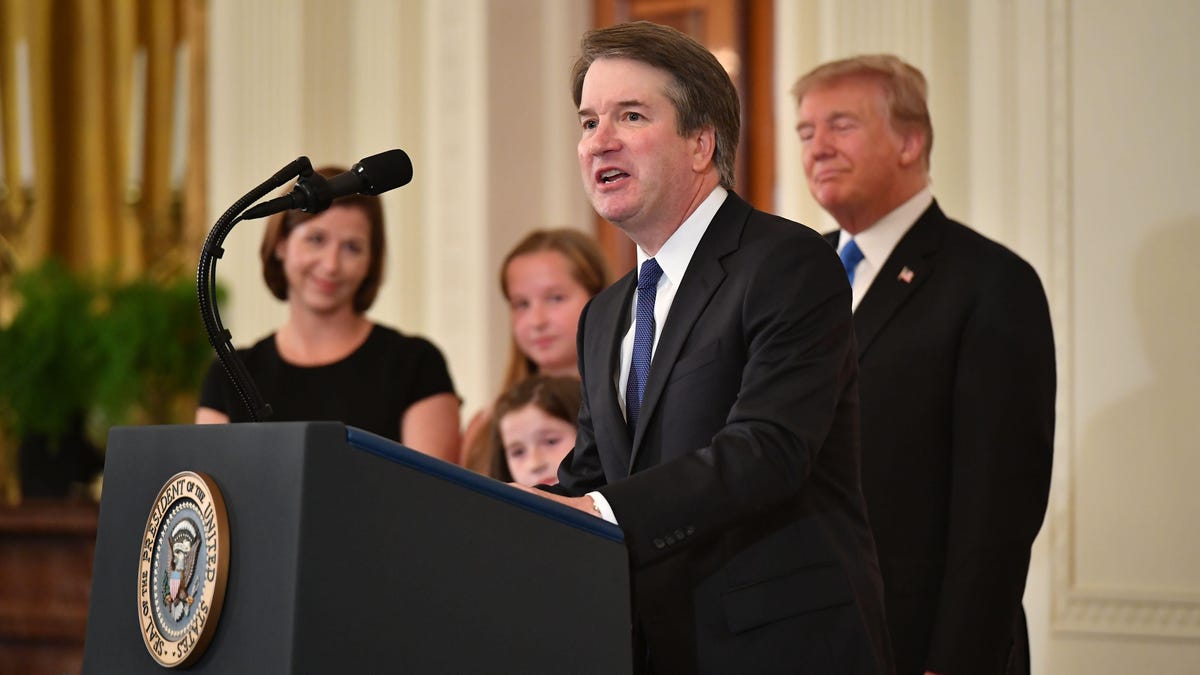What Kavanaugh's confirmation to the Supreme Court means for tech
The new justice could decide on issues such as net neutrality and online privacy in the years to come.

Judge Brett Kavanaugh was confirmed by the Senate on Saturday.
Brett Kavanaugh, President Donald Trump's second nominee to the Supreme Court, was confirmed on Saturday by the Senate in a vote that split largely on party lines.
The confirmation, by a 50-48 vote, followed a partisan battle intensified by allegations of sexual misconduct that prompted the Senate Judiciary Committee to hear testimony from Kavanaugh and Christine Blasey Ford, a California professor who accused him of sexually assaulting her when they were both in high school. Kavanaugh denies the allegation.
(You can follow full coverage of the confirmation at our sister site CBSNews.com.)
Trump's choice will have a say on landmark cases for years to come. Supreme Court justices make rulings that affect everything from education to marriage equality to free speech. Technology issues have increasingly appeared on the court's docket. In 2018, the justices ruled on cases that affected online shopping and phone location data history privacy.
In its current session, which started earlier this month, the Supreme Court is expected to hear cases on tech issues again, including an antitrust argument over Apple's App Store.
Kavanaugh, 53, has served as a US Court of Appeals judge for the DC Circuit for 12 years, providing opinions on key tech issues like net neutrality and government surveillance.
The newly confirmed Supreme Court justice sided against net neutrality in a 2017 dissent, arguing that it was "one of the most consequential regulations ever issued by any executive or independent agency in the history of the United States."
Kavanaugh wrote that net neutrality was unlawful because it prevented internet service providers from controlling what type of content they provide to people, violating a company's First Amendment rights. He compared it to cable providers being able to control what customers could watch.
Sen. Chuck Schumer, a Democrat from New York, called Kavanaugh out for his stance on net neutrality in a tweet on July 3.
"Kavanaugh frequently sides with powerful interests rather than defending the rights of all Americans like when he argued that the FCC's #NetNeutrality rule benefiting millions of consumers was unconstitutional," the senator tweeted.
The circuit court judge has also argued in support of the NSA's massive surveillance program.
In 2015, the US Court of Appeals declined to hear a case on the NSA's phone metadata collection, first unveiled by whistleblower Edward Snowden.
In his opinion, Kavanaugh argued that the NSA's surveillance program was consistent with the Fourth Amendment, even without a warrant. He said that data requests from the government were reasonable for national security.
"In my view, that critical national security need outweighs the impact on privacy occasioned by this program," Kavanaugh wrote.
He cited the "third-party doctrine" established in 1979, which allows law enforcement to obtain data on a person without a warrant if they obtained it from a third party.
Investigators in Michigan used the doctrine to gather location data history without a warrant on Timothy Carpenter by acquiring it from his phone provider, MetroPCS. The Supreme Court recently ruled against the third-party doctrine for location history data.
"Judge Kavanaugh's past approaches to net neutrality and defense of the NSA's illegal collection of Americans' call records, which was based on a justification that the Supreme Court has rightly questioned in Carpenter, are concerning," Corynne McSherry, the Electronic Frontier Foundation's legal director, said at the time of his nomination.
First published July 9, 6:06 p.m. PT
Update, July 10 at 11:53 a.m. PT: Adds statement from the EFF.
Update, Oct. 6 at 10:20 p.m. PT: Republishes with news of Kavanaugh's confirmation.
Tech Enabled: CNET chronicles tech's role in providing new kinds of accessibility.
Blockchain Decoded: CNET looks at the tech powering bitcoin -- and soon, too, a myriad of services that will change your life.

